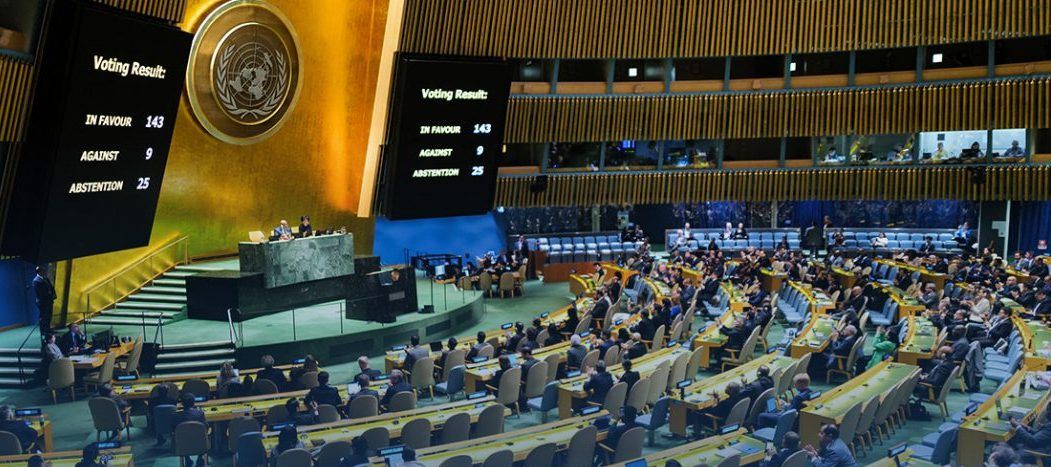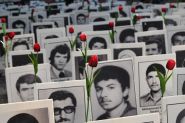- Home
- Middle East
- UN General Assembly Votes for End of 'Unlawful' Israeli Occupation

©(Photo by Charly TRIBALLEAU / AFP)
UN member states formally demanded in a non-binding resolution Wednesday an end to the Israeli occupation of the Palestinian territories within 12 months and sanctions for non-compliance.
The text, which Israel said would fuel violence if adopted, is based on an advisory opinion from the International Court of Justice calling Israel's occupation since 1967 "unlawful."
There were 124 votes in favor, 14 against and a notable 43 abstentions.
Arab countries called the special session of the assembly just days before dozens of heads of state and government meet at the UN headquarters to address the kick off of this year's General Assembly session.
The resolution "demands that Israel brings to an end without delay its unlawful presence in the Occupied Palestinian Territory," and that this be done "no later than 12 months from the adoption."
The first draft text gave only six months.
"The idea is you want to use the pressure of the international community in the General Assembly and the pressure of the historic ruling by the ICJ to force Israel to change its behavior," said Palestinian Ambassador to the UN Riyad Mansour on Monday.
Israel firmly rejected the resolution.
"This is a shameful decision that backs the Palestinian Authority's diplomatic terrorism," said Israel's ambassador to the UN Danny Danon.
"Instead of marking the anniversary of the October 7 massacre by condemning Hamas and calling for the release of all 101 of the remaining hostages, the General Assembly continues to dance to the music of the Palestinian Authority, which backs the Hamas murderers," he said.
Withdrawal of Israeli Forces
The resolution "demands" the withdrawal of Israeli forces from the Palestinian territories, a halt to new settlements, the return of seized land and property, and the possibility of return for displaced Palestinians.
It also calls on states "to take steps toward ceasing" arms provisions to Israel when there are "reasonable grounds to suspect that they may be used in the Occupied Palestinian Territory."
"The Palestinians want to live -- not survive. They want to be safe in their homes," said Mansour Tuesday ahead of the passage of the first resolution ever introduced by the Palestinians.
"How many more Palestinians need to be killed before change finally takes place to stop this inhumanity?"
The ICJ opinion was "a historic opinion as this was the first time the court examined the Israeli occupation as a whole," Mansour said.
US Ambassador Linda Thomas-Greenfield condemned the resolution ahead of the vote as "inflammatory" and said it "is not going to advance the cause of peace."
"It also fails to acknowledge, among other things, that Hamas, a terrorist organization, is currently exerting power, control and influence in Gaza," Thomas-Greenfield added.
The United States voted against the resolution.
While the Security Council is largely paralyzed on the Gaza issue -- with the United States repeatedly vetoing censures of its ally Israel -- the General Assembly has adopted several texts in support of Palestinian civilians amid the current war.
Unlike in the Security Council, no country in the General Assembly has veto power.
With AFP
The text, which Israel said would fuel violence if adopted, is based on an advisory opinion from the International Court of Justice calling Israel's occupation since 1967 "unlawful."
There were 124 votes in favor, 14 against and a notable 43 abstentions.
Arab countries called the special session of the assembly just days before dozens of heads of state and government meet at the UN headquarters to address the kick off of this year's General Assembly session.
The resolution "demands that Israel brings to an end without delay its unlawful presence in the Occupied Palestinian Territory," and that this be done "no later than 12 months from the adoption."
The first draft text gave only six months.
"The idea is you want to use the pressure of the international community in the General Assembly and the pressure of the historic ruling by the ICJ to force Israel to change its behavior," said Palestinian Ambassador to the UN Riyad Mansour on Monday.
Israel firmly rejected the resolution.
"This is a shameful decision that backs the Palestinian Authority's diplomatic terrorism," said Israel's ambassador to the UN Danny Danon.
"Instead of marking the anniversary of the October 7 massacre by condemning Hamas and calling for the release of all 101 of the remaining hostages, the General Assembly continues to dance to the music of the Palestinian Authority, which backs the Hamas murderers," he said.
Withdrawal of Israeli Forces
The resolution "demands" the withdrawal of Israeli forces from the Palestinian territories, a halt to new settlements, the return of seized land and property, and the possibility of return for displaced Palestinians.
It also calls on states "to take steps toward ceasing" arms provisions to Israel when there are "reasonable grounds to suspect that they may be used in the Occupied Palestinian Territory."
"The Palestinians want to live -- not survive. They want to be safe in their homes," said Mansour Tuesday ahead of the passage of the first resolution ever introduced by the Palestinians.
"How many more Palestinians need to be killed before change finally takes place to stop this inhumanity?"
The ICJ opinion was "a historic opinion as this was the first time the court examined the Israeli occupation as a whole," Mansour said.
US Ambassador Linda Thomas-Greenfield condemned the resolution ahead of the vote as "inflammatory" and said it "is not going to advance the cause of peace."
"It also fails to acknowledge, among other things, that Hamas, a terrorist organization, is currently exerting power, control and influence in Gaza," Thomas-Greenfield added.
The United States voted against the resolution.
While the Security Council is largely paralyzed on the Gaza issue -- with the United States repeatedly vetoing censures of its ally Israel -- the General Assembly has adopted several texts in support of Palestinian civilians amid the current war.
Unlike in the Security Council, no country in the General Assembly has veto power.
With AFP
Read more


Comments